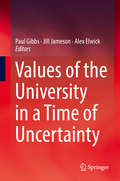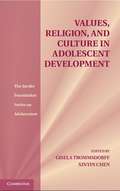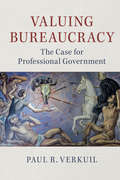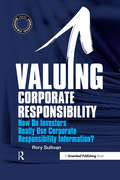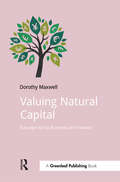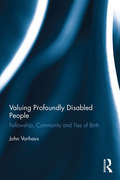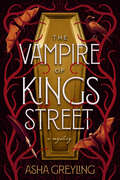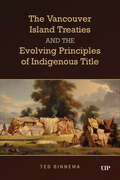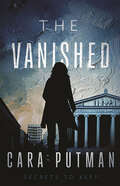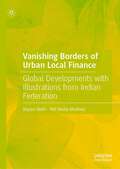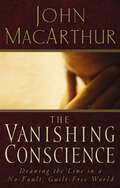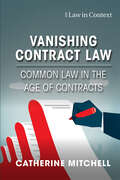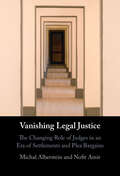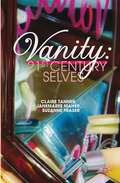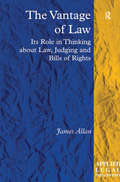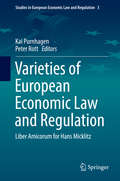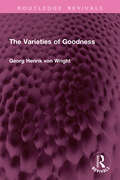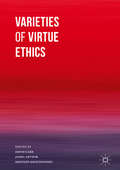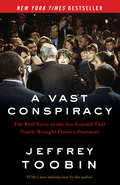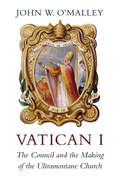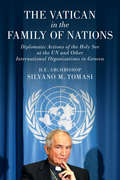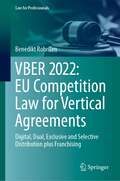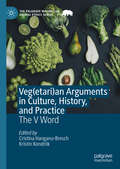- Table View
- List View
Values of the University in a Time of Uncertainty
by Paul Gibbs Jill Jameson Alex ElwickThis deliberately wide-ranging book addresses issues related to trust, compassion, well-being, grace, dignity and integrity. It explores these within the context of higher education, giving existential and empirical accounts of how these moral duties can be expressed within the academy and why they ought to be. The chapters range from values used in the marketing and management of institutions to their realisation in therapeutic and teacher training spaces. The book opens with a specific introduction which positions the work and outlines the context of duties and obligations at play. This is followed by two distinct but related sections including chapters on theoretical issues, organisational practices and personal praxis. The first part is more abstract and theoretical, the second locates the values discussed within the practices of the university. In doing so the book encompasses a wide range of issues from multi-disciplinary and geo-political regions. The authors are a mixture of world-leading authorities on values in higher education and earlier career researchers, who are nonetheless equally passionate contributors. This mix gives the book vibrancy and offers insight which appeals to both an academic and managerial readership.
Values, Religion, and Culture in Adolescent Development
by Gisela Trommsdorff Xinyin ChenCultural values and religious beliefs play a substantial role in adolescent development. Developmental scientists have shown increasing interest in how culture and religion are involved in the processes through which adolescents adapt to environments. This volume constitutes a timely and unique addition to the literature on human development from a cultural-contextual perspective. Editors Gisela Trommsdorff and Xinyin Chen present systematic and in-depth discussions of theoretical perspectives, landmark studies, and strategies for further research in the field. The eminent contributors reflect diverse cultural perspectives, transcending the Western emphasis of many previous works. This volume will be of interest to scholars and professionals interested in basic developmental processes, adolescent social psychology, and the sociological and psychological dimensions of religion.
Valuing Bureaucracy: The Case for Professional Government
by Paul R. VerkuilTo be effective, government must be run by professional managers. When decisions that should be taken by government officials are delegated to private contractors without adequate oversight, the public interest is jeopardized. Verkuil uses his inside perspectives on government performance and accountability to examine the tendencies at both the federal and state levels to 'deprofessionalize' government. Viewing the turn to contractors and private sector solutions in ideological and functional terms, he acknowledges that the problem cannot be solved without meaningful civil service reforms that make it easier to hire, incent and, where necessary, fire career employees and officials. The indispensable goal is to revitalize bureaucracy so it can continue to competently deliver essential services. By highlighting the leadership that already exists in the career ranks, Verkuil senses a willingness, or even eagerness, to make government, like America, great again.
Valuing Corporate Responsibility: How Do Investors Really Use Corporate Responsibility Information? (The Responsible Investment Series)
by Rory SullivanInvestors have taken a long time to pay attention to corporate responsibility. Despite the growing number of companies that were taking action to manage the social and environmental impacts of their activities and operations and that were reporting on their corporate responsibility performance, mainstream investors' interest in governance issues was, on the whole, piqued only in those situations where a major accident or scandal hit the headlines. This has changed dramatically. With over 600 large investment institutions, including asset managers, insurance companies and pension funds having signed the UN-backed Principles for Responsible Investment, it can now be plausibly argued that "responsible investment" has become mainstream. This change is potentially of huge significance, and the investment community is now widely seen as one of the key audiences for the thousands of corporate responsibility reports produced each year. Yet the reality is that there is a striking lack of understanding among companies of investors' interests. The consequence has been that, despite many companies identifying investors as one of the critical audiences for their corporate responsibility reports, most investors – even those that have made commitments to responsible investment – see these reports as irrelevant to their investment decision-making. The problem is compounded by the singularly poor job that investors do of explaining to companies what sort of information they are really interested in, and where corporate responsibility performance fits into their overall assessments of companies. This has led to frustrations on both sides. Investors have been accused of not paying sufficient attention to companies' corporate responsibility performance, and companies have been accused of producing information that not only has no immediate relevance to investors but, worse, seems to have no relevance to the key business challenges that these companies face. Valuing Corporate Responsibility aims to address the "dialogue of the deaf" that characterizes too many of the discussions between companies and their investors on corporate responsibility issues, through: 1. Explaining to companies what responsible investment looks like in practice and, from this analysis, explaining what sort of corporate responsibility information investors are interested in and how this information is used in practice. 2. Explaining to investors some of the practical difficulties faced by companies when preparing corporate responsibility reports and the implications for the quality and utility of the data provided in these reports. Valuing Corporate Responsibility also analyses how issues such as investors' views on materiality and investment time-frames influence the dialogue that investors have with companies on corporate responsibility matters. It concludes that there is a need for a major rethink of current approaches to responsible investment, as the manner in which most investors are implementing their responsible investment commitments is unlikely to see them making a substantial contribution to improving corporate responsibility performance or to the wider goals of sustainable development. Written by one of the world's leading experts on responsible investment, Valuing Corporate Responsibility is one of the most important books to be written on corporate responsibility over the past decade. It is of relevance not only to companies and to responsible investment professionals but to all those interested in really understanding how companies and their investors relate to each other and the implications of this relationship for sustainable development.
Valuing Natural Capital: Future Proofing Business and Finance (Doshorts Ser.)
by Dorothy MaxwellCompanies that will succeed in the long-term are integrating natural and social capital into their business model now. Natural capital, the resources and critical support services nature provides, underpins our entire global economy. Yet despite its vast social and economic value, the many benefits of natural capital are often assumed to be "free". The future shock for business is the potential for profit to be wiped out as natural capital is internalized through regulation and markets. Freshwater, forests and biodiversity are being consumed at an alarming rate, and critical support systems such as the ability to regulate climate are failing. As these and other sustainability challenges develop, businesses and their investors need to understand their role in maintaining natural capital and their natural capital risks and opportunities. The language of finance provides a useful approach for communicating trade-offs and prioritizing sustainability at CFO, CEO and board level: companies who "future-proof" now will position themselves to thrive in a resource-constrained world. They will mitigate risk, secure their resource supplies, create long-term value and enhance their resilience, reputation and competitive advantage. This book provides a succinct introduction to natural capital: what natural capital is and how it links to other capitals; the business case for using it in decision-making; where natural capital accounting and valuation fit in the sustainability and financial toolbox; and what real life early adopters of natural capital in business are doing. Views from natural capital leaders across business, finance, accounting, government, research and NGO communities illustrate the theory with practice. Included: Quotes and case examples from CFOs, CEOs and Heads of Sustainability in early adopter businesses (Kingfisher Group, Dow Chemical Company, The Crown Estate, Patagonia®, United Utilities and Marks & Spencer) and financial institutions (Inter-American Development Bank, Citi Group and Credit Suisse).
Valuing Profoundly Disabled People: Fellowship, Community and Ties of Birth (Routledge Research in Special Educational Needs)
by John VorhausGrowing numbers of human beings live with profound and multiple learning difficulties and disabilities. Exploring the moral, social and political implications of this trend, Valuing Profoundly Disabled People addresses questions that are high on policy and practice agendas in numerous regions around the world, including the UK and the EU, the USA, and Australasia. In this important work Vorhaus examines fundamental moral and social questions about profound disability, and each chapter combines a comprehensive review of existing literature with thought-provoking and original philosophical arguments. Vorhaus argues that there is a pressing need to consider the moral and political claims of people whose lives are characterised by extensive impairments, dependency and vulnerability. The book prompts readers to reflect on complex issues relating to the practices of caring, teaching and treating people with profound disabilities in contexts such as education, health care and social policy. Providing a much-needed contribution to the field, this book will be of interest to postgraduates, academics and researchers in a number of distinct and interrelated fields, including disability and impairment, human rights, philosophy, sociology, health and social policy, and education. The book will also be of great interest to practitioners and policymakers seeking to promote the aims of realising human potential and respecting disability.
The Vampire of Kings Street: A Mystery
by Asha GreylingIn this gothic debut novel, perfect for fans of Tread of Angels and Gail Carriger&’s Soulless, Miss Radhika Dhingra, a newly minted lawyer in 19th century New York, never expected that her first client would be a vampire accused of murder. Having a resident vampire is just the thing for upper-class New Yorkers–besides being a status symbol, they make excellent butlers or housekeepers. The only thing they require in return is a drop or two of blood and a casket to shut out the dawn&’s early light. Tolerated by society only if they follow a strict set of rules, vampires are seen as &“less than&”–and as the daughter of immigrants, Radhika knows firsthand how this feels. Accused of murder, her undead client Mr. Evelyn More, knows that the cards are stacked against him.With the help of a journalist friend and a diminutive detective inspector, Miss Dhingra sets out to prove her client&’s innocence and win his freedom. Failure will mean Mr. More&’s death, the end of her dreams of becoming a successful attorney, and the loss of the vampire Miss Dhingra has begun to call her friend.Offering an alternative paranormal history, delightful characters, and insightful social commentary, The Vampire of Kings Street will thrill readers of Deanna Rayburn and Rebecca Roanhorse.
The Vancouver Island Treaties and the Evolving Principles of Indigenous Title
by Ted BinnemaThe Vancouver Island Treaties and the Evolving Principles of Indigenous Title illuminates the history of the enigmatic Vancouver Island treaties of the 1850s, offering new interpretations based on a fresh, exhaustive, and multidisciplinary critical analysis of relevant evidence. To understand as fully as possible the motivations, intentions, and understandings of the Indigenous and non-Indigenous signatories to the treaties, Ted Binnema places the treaties within the context of thousands of years of Vancouver Island history and hundreds of years of land-purchase agreements involving Indigenous peoples. The book explores the evolving concepts and principles of Indigenous title from the first Dutch and English treaties with Indigenous North Americans in the 1620s to the increasingly detailed articulations fuelled by debates and crises in Australia and New Zealand in the 1830s and 1840s. Binnema explains that Indigenous people themselves played important roles in the formation and elaboration of the principles of Indigenous title in the British World. Drawing on previously neglected archival documents and multidisciplinary evidence in linguistics, archaeology, anthropology, fisheries biology and biological sciences, and oral historiography, the book provides a new model for the study of the idea of Indigenous title and Indigenous land-purchase treaties worldwide.
Vanessa: A Portrait of Evil
by Wensley ClarksonThe compelling and disturbing true story of Vanessa George and the evil abuse she doled out upon the children of more than 300 families.As a nursery worker, wife and mother, she was a figure to place trust in. Yet her adulterous relationship and sick love triangle with Colin Blanchard and Angela Allen drew her into a dark world of violence and sexual abuse. To compete for Blanchard's attention she would do everything in her power to impress him, even if this meant committing unspeakable acts of sexual violence on children as young as two years old.What could have driven a mother to betray not only her daughters and loving husband, but the very families who entrusted her with their children? How could a seemingly caring women become engaged in a sordid and vile love triangle with a man and woman she had never met? Were there events in her own childhood that pushed her to commit these acts?True crime expert Wensley Clarkson pieces together the events surrounding the case as well as new investigative research to compile a fascinating yet disturbing account of a case which shocked a nation.We may never know the full extent of Vanessa George's cruelty, but the horror of her story will remain as a chilling memory for generations.
Vanish
by Tom PawlikThree strangers each encounter a mysterious storm and awake the next day to find that everyone else has vanished. When their paths cross, they discover they are being forced to relive vivid hallucinations of events from their past.
The Vanished: A Novel
by Cara Putman"Putman's legal expertise shines in this compelling and intricately plotted romantic suspense. Highly recommended!" --Colleen Coble, USA Today best-selling author Janae Simmons left the small town of Kedgewick, Virginia, ten years ago to pursue her legal career and never looked back--until a professional mistake leads her to her grandmother's historic carriage house and to the town where her past threatens to find her. The quiet streets echo with her grandfather's sterling reputation, one that conflicts with fresh questions that claw at Janae, launching her on a reluctant journey to unearth his secrets. When her new job at a local law firm doesn't live up to expectations, she wonders if coming home was the right decision. Carter Montgomery starts his art preservation career with the only job he can get--director at the Elliott Museum of Art. At least Kedgewick is a nice enough town to provide him and his nephew with a safe place to grieve the loss of Carter's sister. But Carter's calm days disappear when an elderly woman claims two paintings in the museum's collection were stolen from her family during World War II. Carter enlists Janae's help to unravel the legal labyrinth of art ownership, and the peaceful facade of Kedgewick morphs into a hot bed of secrets. When an attorney turns up dead and Janae uncovers another painting, what began as a simple legal issue spirals into a race against time. As the web of intrigue tightens, the duo must confront a looming question: What dark truths lie beneath the surface, waiting to be exposed? "Cara Putman has once again created an exciting cast of characters. I was immediately drawn in by Janae and Carter's unique chemistry. This is one story you don't want to miss." --Rebecca Hemlock, award-winning author of Fury in the Shadows
Vanishing Borders of Urban Local Finance: Global Developments with Illustrations from Indian Federation
by Shyam Nath Yeti Nisha MadhooThis book examines the emerging trends in vanishing borders of urban local government finance due to uncertain local tax and expenditure regimes. It analyzes the global developments with illustrations from state budgetary operations of the Indian federation. This trend has gained momentum due to concentration of population in cities and big towns as a consequence of globalization, leading to enhanced environmental vulnerability due to climate change. Expanding expenditure needs have not been corresponded by revenue regimes and transfers. Moreover, involving corporate sector in local area preference initiatives through mandatory corporate social responsibility (CSR) is an interesting development. It is expected to work as a local fiscal additionality to supplement locally provided civic and infrastructure services. This additionality may also evolve into public private partnerships at the local level. Such development however has the potential of displacing local government operations. The focus of the book hinges around critically examining setbacks to fiscal decentralization and challenges in improving the status of urban local finances to enhance fiscal autonomy of these governments, particularly in Indian scenario. The book also explores the possibility of an expanded role of local fiscal policy in the context of globalization and climate change, besides addressing the conventional responsibilities with respect to quality of civic services.
The Vanishing Conscience
by John MacarthurAre you losing your ability to recognize sin? Are you becoming a person who finds it easy to shift blame, deny guilt, or excuse moral failure in yourself or others?In this challenging yet compelling book, John MacArthur encourages you to confront the culture's flight from moral responsibility. With sound biblical truth, this book shows how and why sin must be dealt with if you are to live in a way that pleases God. With clairty and insight, John MacArthur provides you with solutions for attaining a personal holiness that can take you from living a life of blame and denial to one of peace and freedom.Praise for The Vanishing Conscience:". . . a wake-up call and an alarm to jolt the sleeping church. Not all will like it, but all should read it. In this day of morality by majority, self-centered ministry, and twilight-zone theology, a clear word like this is long overdue." -Dr. Adrian Rogers, Pastor, Bellevue Baptist Church". . . a clear and prophetic word that we must hear and heed." -Dr. Joseph M. Stowell, President, Moody Bible Institute"With the clarion call of a prophet, MacArthur points us back to something we have forgotten: the value and importance of a clean conscience." -Greg Laurie, Senior Pastor, Harvest Christian Fellowship
Vanishing Contract Law: Common Law in the Age of Contracts (Law in Context)
by Catherine MitchellEnglish contract law provides the invisible framework that underpins and enables much contracting activity in society, yet the role of the law in policing many of our contracts now approaches vanishing point. The methods by which contracts come into existence, and notionally create binding obligations, have transformed over the past forty years. Consumers now enter into contracts through remote and automated processes on standard terms over which they have little control. This book explores the substantive weakening of the institution of contract law in a society heavily dependent on contracts. It considers significant areas of contracting activity that affect many people, but that escape serious and sustained legal scrutiny. An accessibly written and succinct account of contract law's past, present and future, it assesses the implications of a diminished contract law, and the possibilities, if any, for its revival.
Vanishing Legal Justice: The Changing Role of Judges in an Era of Settlements and Plea Bargains
by null Michal Alberstein null Nofit AmirA full trial has become an uncommon phenomenon in many legal systems, replaced largely by promotion of settlement and plea-bargaining. This book uncovers today's judicial role in this radically changed legal setting using multiple methods. Over five years, researchers analyzed court dockets, studied judges in action, and conducted interviews with judges and lawyers. This book, which spans several legal cultures, follows in the footsteps of the 'vanishing trial phenomenon', probing its existence beyond common law systems. In doing so, it provides insights into the changing judicial role and the metamorphosis of legal systems. Offering a new perspective on possible futures of legal systems, including the use of artificial intelligence, the authors provide a rich context for legal scholars and policymakers to redesign the architecture of conflicts. Moreover, they introduce new jurisprudential perspectives on the relationship between law and conflict resolution, with an emphasis on the judicial role.
Vanity: 21st Century Selves
by Claire Tanner Janemaree Maher Suzanne FraserWhat role does 'vanity' play in the lives of 21st century subjects? Exploring a range of fields including public health, information technology, media studies and feminist approaches to the body and beauty, this book offers a broad analysis of how 'vanity' shapes contemporary Western societies and its understandings of selfhood.
The Vantage of Law: Its Role in Thinking about Law, Judging and Bills of Rights (Applied Legal Philosophy)
by James AllanThe premise of this book is that a shift of vantage will help elucidate various important issues of law related to judging, to bills of rights and to more abstract questions of legal philosophy. The work begins by focussing on the jurisprudential issue of whether it is desirable to keep separate the demands of law and of morality and uses the device of changing vantages to elucidate the many issues that fall under that aegis. This is followed by a consideration of how judges ought to do their job when interpreting and whether the rule of law ideal differs from rule by judges. The last part of the book focuses explicitly on bills of rights. Building on the earlier parts, the author uses his device of shifting vantages to provide insights into how these instruments affect democratic decision-making and from which perspectives they will look attractive and unattractive. Written in a clear, accessible and engaging style, the book demonstrates that vantage point is a key criterion affecting how one understands and evaluates, firstly, some of the theoretical debates in jurisprudence and then, secondly, what judges are doing and whether a bill of rights is desirable or not.
Varieties of European Economic Law and Regulation
by Kai Purnhagen Peter RottThis is the first book to comprehensively analyze the work of Hans Micklitz, one of the leading scholars in the field of EU economic law. It brings together analysts, academic friends and critics of Hans Micklitz and results in a unique collection of essays that evaluate his work on European Economic Law and Regulation. The contributions discuss a wide range of Micklitz' work: from his theoretical work on private law beyond party autonomy, with a special focus on its regulatory function, to the illustration of how his work has built the basis for current solutions such as used in solving the financial crisis. The book is divided into sections covering foundations of private law, regulatory law, competition and intellectual property law, product safety law, consumer contract law and the enforcement of law. This book clearly shows the enormous impact of Hans Micklitz' work on the EU legal system in both scholarship and practice.
The Varieties of Goodness (Routledge Revivals)
by Georg Henrik von WrightFirst published in 1963, Varieties of Goodness presents analysis of the concept of value and its relations with the neighbouring concepts of fact and norm. The author discusses important themes such as instrumental and technical goodness; utilitarian goodness; goodness of faculties; active and passive pleasure; ethical hedonism; ideals of happiness; divisions of the virtues; connection between values and norms; concept of duty; and justice. This is a must read for scholars and researchers of philosophy.
Varieties of Virtue Ethics
by David Carr James Arthur Kristján KristjánssonThis book explores recent developments in ethics of virtue. While acknowledging the Aristotelian roots of modern virtue ethics - with its emphasis on the moral importance of character - this collection recognizes that more recent accounts of virtue have been shaped by many other influences, such as Aquinas, Hume, Nietzsche, Hegel and Marx, Confucius and Lao-tzu. The authors also examine the bearing of virtue ethics on other disciplines such as psychology, sociology and theology, as well as attending to some wider public, professional and educational implications of the ethics of virtue. This pioneering book will be invaluable to researchers and students concerned with the many contemporary varieties and applications of virtue ethics.
A Vast Conspiracy: The Real Story of the Sex Scandal That Nearly Brought Down a President
by Jeffrey ToobinAccount of the Clinton scandals.
Vatican I: The Council and the Making of the Ultramontane Church
by John W. O'MalleyThe enduring influence of the Catholic Church has many sources—its spiritual and intellectual appeal, missionary achievements, wealth, diplomatic effectiveness, and stable hierarchy. But in the first half of the nineteenth century, the foundations upon which the church had rested for centuries were shaken. In the eyes of many thoughtful people, liberalism in the guise of liberty, equality, and fraternity was the quintessence of the evils that shook those foundations. At the Vatican Council of 1869–1870, the church made a dramatic effort to set things right by defining the doctrine of papal infallibility. In Vatican I: The Council and the Making of the Ultramontane Church, John W. O’Malley draws us into the bitter controversies over papal infallibility that at one point seemed destined to rend the church in two. Archbishop Henry Manning was the principal driving force for the definition, and Lord Acton was his brilliant counterpart on the other side. But they shrink in significance alongside Pope Pius IX, whose zeal for the definition was so notable that it raised questions about the very legitimacy of the council. Entering the fray were politicians such as Gladstone and Bismarck. The growing tension in the council played out within the larger drama of the seizure of the Papal States by Italian forces and its seemingly inevitable consequence, the conquest of Rome itself. Largely as a result of the council and its aftermath, the Catholic Church became more pope-centered than ever before. In the terminology of the period, it became ultramontane.
The Vatican in the Family of Nations: Diplomatic Actions of the Holy See at the UN and other International Organizations in Geneva
by Robert J. Ghanem Antoine Abi Vincenzo Buonomo Richard Gyhra Marenghi Carlo Maria Stefano Saldi Tomasi Silvano M. Vitillo Silvano M. VitilloBased on a collection of statements delivered between 2003 and 2015, The Vatican in the Family of Nations provides a new understanding of the social doctrine and actions of the Catholic Church in international law and relations. These statements address contemporary issues that stir deep emotional responses, from disarmament, migrations, trade, and intellectual property to discrimination and freedom of conscience. This volume disputes irrational fears of newcomers, offers reasonable adaptations to allow for peaceful coexistence, and insists on investigating the root causes of today's conflicts and displacements. As an independent voice, the Holy See offers these reflections with the view of prioritizing the common good before confessional interests, even when their aims and ends converge. In this sense, this book is a unique collection in international literature on the intersection of theology, human rights and social issues, which opens courageous new paths for the future.
VBER 2022: Digital, Dual, Exclusive and Selective Distribution plus Franchising (Law for Professionals)
by Benedikt RohrßenThis book tackles the Vertical Block Exemption Regulation ("VBER"). The VBER 2022 is the new playbook in Europe for vertical agreements. Vertical agreements, i.e. between parties from different levels of the production or distribution chain, are ubiquitous in the EU economy. Vertical agreements which appreciably restrict competition are, in principle, void, and subject to fines. By exception, agreements may already fall outside the scope of competition law or may be exempt if their pro-competitive effects prevail. Whether they do or not requires an individual assessment of each agreement, with respective legal uncertainty. The VBER, however, is the shortcut to legally certain vertical agreements because it exempts groups of vertical agreements from the prohibition of anti-competitive agreements. It therefore builds the practical core of distribution law. Only understanding and implementing the VBER ensures a compliant distribution set-up. This goes for all kinds of vertical agreements, especially: digital, dual, exclusive and selective distribution plus franchise. The VBER 2022 is intended to take into account market developments, in particular the strong growth in e-commerce. Digitalisation has reinforced the trend toward verticalization – and thus toward dual distribution. The VBER 2022 now "reboots" the existing playbook, making it fit for digital distribution. And this book shall help – as a shortcut to understanding the VBER – to quickly and easily pass the transition to the new rules. This book is written from the distribution / contract drafting perspective. It is born out of the author’s practice as German attorney-at-law and partner in the international law firm Taylor Wessing. This book aims at providing private practitioners, in-house counsels as well as officers within authorities and judges practical guidance on the “rebooted” competition law regime in the European Union, including many examples of provisions to be used, especially in distribution and franchise agreements. It also tables and checklists for creating new and adapting existing agreements to the VBER. This book has been written while accompanying the reform discussions and the introduction of the VBER 2022 as an author, speaker and private practitioner.
Veg: The V Word (The Palgrave Macmillan Animal Ethics Series)
by Cristina Hanganu-Bresch Kristin KondrlikThis collection explores the arguments related to veg(etari)anism as they play out in the public sphere and across media, historical eras, and geographical areas. As vegan and vegetarian practices have gradually become part of mainstream culture, stemming from multiple shifts in the socio-political, cultural, and economic landscape, discursive attempts to both legitimize and delegitimize them have amplified. With 12 original chapters, this collection analyses a diverse array of these legitimating strategies, addressing the practice of veg(etari)anism through analytical methods used in rhetorical criticism and adjacent fields. Part I focuses on specific geo-cultural contexts, from early 20th century Italy, Serbia and Israel, to Islam and foundational Yoga Sutras. In Part II, the authors explore embodied experiences and legitimation strategies, in particular the political identities and ontological consequences coming from consumption of, or abstention from, meat. Part III looks at the motives, purposes and implication of veg(etari)anism as a transformative practice, from ego to eco, that should revolutionise our value hierarchies, and by extension, our futures. Offering a unique focus on the arguments at the core of the veg(etari)an debate, this collection provides an invaluable resource to scholars across a multitude of disciplines.
